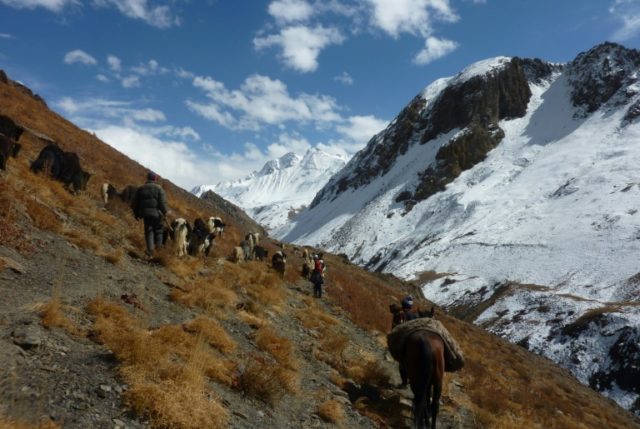WASHINGTON, DC — China may use its multi-trillion-dollar One Belt, One Road (OBOR) project to “support and mask” its military objectives as it continues to try to “displace” its rival the United States and expand its influence in Afghanistan and the Middle East, particularly in Lebanon, a top American commander warned on Tuesday.
American Gen. Joseph Votel, the commander of U.S. Central Command (CENTCOM), told a Senate panel that China is seeking a deeper relationship with Lebanon. Iran’s narco-terrorist proxy Hezbollah holds a tight grip over politics in Lebanon as a legitimate party in the country.
Votel’s comments are part of CENTCOM’s 2019 posture statement unveiled by Votel on Tuesday in the form of written testimony prepared for the Senate Armed Services Committee. The posture statement, presented to Congress each year, provides a summary of CENTCOM’s role and mission in its area of responsibility (AOR) – mainly the Middle East and Afghanistan.
Gen. Votel wrote in the statement:
The bottom line is simple: If left unchecked, the expanding global reach of China’s economic and military initiatives, as well as Russia’s objective to weaken or subvert Western security structures in the CENTCOM AOR will pose a significant challenge to U.S. prosperity, security, and regional stability.
…
Both Russia and China are increasing their efforts to gain access and influence in the country [of Lebanon] because of its key location on the Mediterranean and proximity to Syria. Hezbollah holds political clout which gives it a de-facto veto on Lebanese policy decisions, fields an armed militia that does not act on the behest of an elected government and builds popular support by acting as a social service provider – all undermining the role of the legitimate [U.S.-backed] Lebanese government and armed forces.
Russia and reportedly China both have a military presence in Syria. Beijing has expressed concern about the return of Chinese Uighur [or Uyghur] Muslims who traveled to engage in jihad in the Middle East amid the Islamic State’s (ISIS/ISIL) rise in 2014.
In CENTCOM’s 2018 posture statement, Gen. Votel noted that China is pursuing deeper cooperation with U.S.-designated state sponsor of terror Iran. Votel did not touch on the China-Iran relationship this year.
China and Russia will try to fill the potential void in the Middle East left behind by the upcoming U.S. withdrawal in Syria, Votel cautioned on Tuesday, noting that the pullout process will be gradual.
Last year, U.S. Southern Command (SOUTHCOM) cautioned that China’s OBOR, also known as the Belt and Road Initiative (BRI), may create security vulnerabilities for the United States by allowing Beijing to expand its influence across the world.
Echoing those warnings, Gen. Votel declared in the 2019 posture statement:
China uses its “One Belt – One Road” initiative as an economic lever to provide access and influence across the Central Region [of the Middle East and Afghanistan]. … For China, economic power is the primary tool, and while many “One Belt – One Road” projects do not pose direct threats to U.S. national interests, burgeoning Chinese economic power could support and mask longer-term military and political objectives.
Also known as the Belt and Road Initiative (BRI), China’s ambitious OBOR seeks to revive the ancient Silk Road by linking Beijing to Europe and the Western Hemisphere through a massive network of land and sea routes.
Gen. Votel told lawmakers on Tuesday that the China- and Russia-linked great power competition threat is alive and well across the Middle East and Afghanistan, stressing in the posture statement:
China and Russia seek to dominate and influence not just their own geographic regions, but the Central Region as well … China and Russia are working very hard today to reshuffle the balance of power in the CENTCOM AOR, trying to displace the U.S from its position of influence. … Across much of the AOR, however, where there is a U.S. presence, there is almost always an existing or developing presence by China, Russia, or both.
Gen. Votel suggested that America’s military presence in Afghanistan provides the United States with a chance to keep tabs on Beijing.
“Central and South Asia cooperation between the U.S. and China offers opportunities for peaceful dialogue and a chance for the U.S. to balance China’s economic rise and reinforce its commitment to global norms for the benefit all,” he wrote in the posture statement.
In early 2018, the Pentagon promoted cooperation with China in fighting jihadis in the Afghanistan-Pakistan region, reportedly home to the largest concentration of terrorist groups in the world.
U.S. President Donald Trump recently indicated that he is considering a military withdrawal from Afghanistan, noting that a residual American presence may remain in the country after the bulk of the foreign troops leave.
Gen. Votel acknowledged that the Pentagon is shifting its efforts from terrorist groups in the Middle East to combat the reemergence of great power rivals China and Russia, emphasizing that those two countries also operate in CENTCOM’s AOR.
Trump’s National Defense Strategy (NDS) has deemed Russia and China as the primary threat facing the United States.
CENTCOM’s 2019 posture statement came days after the U.S. intelligence community cautioned in its annual World Threat Assessment:
China and Russia are more aligned than at any point since the mid-1950s, and the relationship is likely to strengthen in the coming year as some of their interests, and threat perceptions converge, particularly regarding perceived US unilateralism and interventionism and Western promotion of democratic values and human rights.
“Asymmetric strategies” employed by Russia and China “put the U.S. at a disadvantage,” Votel conceded, adding that “a robust and modern U.S. nuclear deterrent helps ensure competition with Russia and China, regardless of where it originates, does not escalate to large-scale war.”

COMMENTS
Please let us know if you're having issues with commenting.